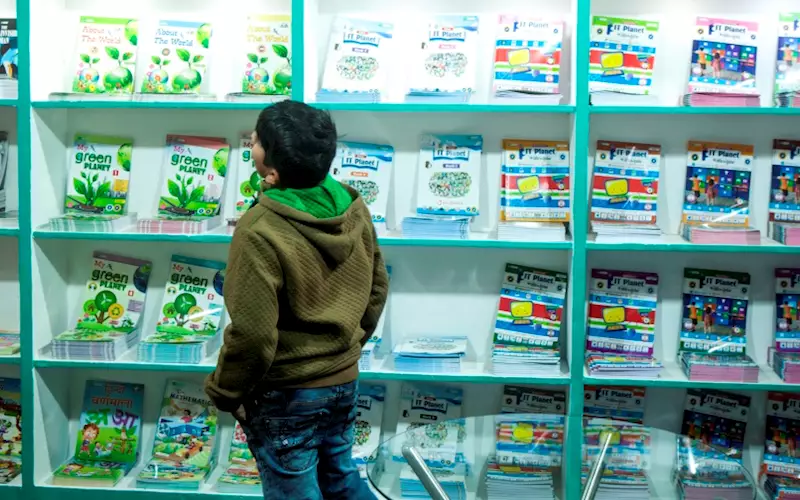Printers in peril as CBSE schools told to use only NCERT textbooks
Already reeling under the effects of demonetisation, the academic book printers (and by extension the publishers of K-12 curriculum) were in for another shock when the Central Board of Secondary Education (CBSE), at a meeting in presence of Central HRD minister Prakash Javadekar, took the decision that all CBSE-affiliated schools will have to follow NCERT textbooks from the academic session 2017-18. Recently, the HRD ministry has also decided to make NCERT books available before the commencement
19 Feb 2017 | By Dibyajyoti Sarma
The National Council of Educational Research and Training (NCERT) is an autonomous organisation set up in 1961 by the Government of India to assist and advise the Central and state governments on policies and programmes for qualitative improvement in school education. The major objectives of NCERT and its constituent units are to undertake, promote and coordinate research in areas related to school education; prepare and publish model textbooks, supplementary material, newsletters, journals and develops educational kits, multimedia digital materials, etc, among others.
The crux of the decision is that textbooks published (and printed) by private publishers, until Class XII, will not be used in CBSE schools anymore. In other words, these publishers will lose out on schools which earlier used to order their books.
Traditionally, CBSE would decide the syllabus. Textbooks containing the same syllabus (say, basic algebra for Class VII) would be available both with NCERT and private publishers. Due to reasons, ranging from unavailability of NCERT books on time or lack of quality content, private schools following the CBSE syllabus usually subscribed to textbooks published by commercial publishers.
Besides CBSE, each state has separate boards for higher secondary education and all have different rules about who can print and publish textbooks. There are also other boards beyond the purview of the government, such as International Baccalaureate, which have their own set of rules.
According to the ministry, the decision was made to make textbooks cheaper for students. Accordingly, this will also standardise study materials for schools across the country.
In a circular, the CBSE has directed schools to summit the number of books they need, from 15 to 22 March 2017. The schools will need to send their demands class-wise, rather than section-wise through 680 CBSE empanelled distribution vendors across the country. The CBSE will also monitor the annual subscription by schools.
This simply means that CBSE/NCERT will now need to print textbooks to the tune of million copies. While private publishers have well established editorial and printing divisions (in-house or long-term print partners), NCERT, as a government body, commissions outside agencies for its books. It has an empanelled list of authors who deliver the content. On the other hand, the agency selects printers through a tendering process.
While the move essentially means that central government has seized total control over publication and distribution of CBSE textbooks, the far-reaching implications of the decision will be played out as the new academic session begins.
K-12 education system in India is one of the largest in the world, with more than 1.5 million schools and 259 million students enrolled. According to the FICCI–Nielsen Report: K-12 Book Publishing: Market Report 2016 released during PubliCon 2016, schools have grown at a CAGR of 2.7%, from 1.36 million in 2010-11 to 1.52 million in 2014-15, while enrolment has grown from 24.7 million in 2010-11 to reach 259 million students in 2014-15, a CAGR of 1.1%. The report estimates that the K-12 Indian book market would grow at a CAGR of 19.6%, from Rs 2,21.7 billion in 2014-15 to Rs 5,41.9 billion by 2019-20.
How the result of the government decision plays out only time will tell. For now, the K-12 textbook printers across the country are bracing to tide over the situation. While many of the publishers/printers have stopped their plans for the next academic year, the growing concern now is what to do with the godown-full of stock. Will these books be pulped or will they find a new lease of life somewhere else?
Improve printing quality, govt tells NCERT
Meanwhile, the Union minister for human resource development, Prakash Javadekar, has directed the NCERT to improve the printing quality of textbooks.
Following the decision to make NCERT textbooks compulsory in all CBSE-affiliated schools, earlier this week, the ministry had directed the council to make sure that the books are available on time and in adequate numbers. The CBSE had also asked the schools to raise online indent and had issued a circular in this regard. Until now, over 400 schools have raised the online indent for the next academic session. A two-member committee of both the bodies has been put in place to monitor the daily progress.
In a news report published in The Times of India, although the circular did not use the term ‘mandatory’, a senior CBSE official said the schools will have to take the ownership of subscribing to private publishers’ books. “We have given the link so that they can raise an online indent. Whether they comply or not will be their prerogative. But they will be answerable for any development thereafter,” the official was quoted as saying.











 See All
See All